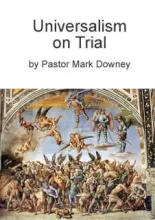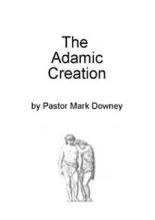God's Existence
by Pastor Mark Downey
Man has been groping with the idea of God since God revealed Himself to man. Man has been struggling with the idea of God because man demands empirical evidences for his five senses. Otherwise, in their finite minds it is incomprehensible to accept the infinite. However, does it make sense for an infinite entity, such as God, to be anything other than beyond the realm of our finite senses? Such an idea of God existing in the natural world as man does, therefore precludes the idea of a supernatural existence of God above and beyond man. Why then do some men accept the existence of God while others do not?
The possibility of error demonstrates the existence of the Absolute or theologically, a Supreme Being of divine perfection. The permutations of such an ideology depend upon the intent of its meaning. If an idea fails to correspond to what is intended, then that idea is in error. Furthermore, the idea is dependent upon an intelligence that has the comprehension of both the idea and its intent. Since there are possibilities for error, there must be an infinite intelligence that reconciles them all.
Believing in the existence of God is permitted by the principle of it making a difference to one's life and making that decision above and beyond an intellectual exercise. This naturally leads to a justification of God's existence, because the possibility of error is not a factor.
Let's take two people looking at the same garden with a cornucopia of fresh produce. One person thinks there's a gardener and the other doesn't. All attempts to detect a gardener fail, albeit the one observer continues to believe that there exists a gardener by virtue of his works in the garden, even though the gardener is not seen or heard. There is no possibility of error in this regard, merely because one observer does not believe that a gardener exists and therefore tries to falsify the believer's claim that there is an unseen and unheard gardener responsible for the garden.
Philosophers have debated that either God's existence is necessary or it is impossible. Impossible only if the idea of God is self contradictory or nonsensical. The idea of supernatural perfection supersedes the idea of impossibility; it is automatically canceled. If we understand God as a Supreme Being of which nothing greater can be conceived, it must by necessity exist. For the assumption that God does not exist leads to the absurdity that it is conceivable that there is something which is greater than the idea of God i.e. nothing greater can be apprehended by reason or logic. The logical impossibility of nonexistence is in and of itself a perfection. God must exist because of an absence of contradiction.
The nonsensical contradictions are found only in the dysfunctional faculties that God anticipated in people getting the wrong ideas and projecting errors in contradistinction to the intent. That is all atheism has ever offered: improper intentions. A person's faculties function properly without the possibility of error, when they function the way God intended them to function. If God designed people in such a way that they came to hold a belief in His existence, and He did, such a belief is not only justified, it is verified in their own existence.
The problem is that some people have made the willful choice in siding with error and thus limiting their existence to the natural world. The debate is ancient, but the modern voice of error sullies the level of argument to woefully unsophisticated 'Joe Sixpacks' regurgitation of empirical demands and then proceeds to point to the fact that there is no physical evidence that their eyes can see or their nose can smell. For them, there is no reason to think that God exists. Their primary reason is that they don't want to think.
Since the debate begins with definitions, let's take a look at God from the standpoint of a dictionary. To quote Webster, "1. The Supreme Being; Jehovah; the eternal and infinite spirit, the creator, and the sovereign of the universe." There we have the idea of God, the creator and sovereign of the universe. God, therefore, according to the most putative sources available, does, in fact, exist. If there is any possibility of error in this definition, then the promulgators of error should publish their own dictionaries. Of course, it's a war of words and always has been. That's why God is equal to "The Word".
God existing as an idea is so widely recognized, that you can find the divine word in just about every general reference book in any library. God as an idea exists just as much as the ideas of love or algebra or extraterrestrials exist. Not only that, but God exists as a particular type of idea, exclusive of all other ideas i.e. God exists as an ideal. In this respect, God exists as much as anything else. God can be said to exist as a living component of society, His Word is said to be Living, as a revealed concept that many people organize their lives around.
There are enemies of this concept who are the proponents of error and throughout history have misinterpreted the existence of God to the detriment of a nation. Their campaign of disinformation is predictable and the main thrust of divine commentary found in the Word. There is nothing new under the sun for those who, generation after generation, reject the existence of God.
The indubitable existence of God, this easily observable laboratory of social phenomenon, of the supernatural eclipsing the natural world, has nothing whatsoever to do with the type of materialistic God that immature atheists are chomping at the bit to disprove. They cringe at the spiritual manifestations of God, which prove the things they are so fond of demanding. It's the sort of predictive power that believers in God can testify to. How many witnesses does it take to reflect the existence of God? If we acknowledge the social existence of God, we can predict, for example, that a new abortion clinic will meet with greater protest in a community where God's existence is more strongly expressed. We can predict the existence of God in the home, when children are raised up in the ways of the Lord and the family is at peace.
Indeed, many self-professed atheists admit to the validity of faith when they bemoan the long historical record of atrocities committed in the name of God. To fault belief in God for these acts is to admit the existence of God as a powerful ideal capable of directing the affairs of man. It is not the existence of God that is at fault, but the errors of man that confuse what God has communicated. Regrettably, there are those who insist on the existence of a God based upon their own preconceived notions of error. They champion the man of error as the epitome of nature and therefore the possibilities of error becomes the limitation of their existence. Man was not meant to know more about God than what He has wisely revealed.
After all, God to the nominal Christian is more real than a leprechaun only in the sense that God represents more, and to more people, than the leprechaun. The leprechaun exists in the minds of some inebriated Irishmen as a widely understood mythological character, but the scope, complexity and currency of the leprechaun are far far less than those of God or any other small 'g' gods. There can only be one Creator of the universe.
For those who consider God above and beyond myth and superstition, belief is a consideration of reality and credibility that is neither a contradiction or nonsense. No amount of sophistry from burly devils to marshmallow skeptics will persuade those who understand the existence of God. It is a belief in absolute morality (although perhaps never practiced perfectly). The point is that right and wrong is discoverable and an ongoing pursuit. The ideal can be approached through study of and devotion to God.
I have not used any scriptures in this discourse, because it is anathema to those who don't believe in the existence of God. They have been brainwashed to put their ducky arguments in a row. And duck they should, when their day of accountability begins to envelope their soul, spending so much time composing point by point rebuttals mocking God. Who will deliver them?
The idea of God is an ideal act of communication. With this concept, God is above and beyond the material world. An agreeable and perfect moral code can be built upon this foundation. I'm sure there will be those who try and ruin it for everybody. They have nothing better to do with their miserable lives and misery loves company. To such, I say depart to your hellish closets and let God be true. We have a blueprint for happiness. If you stand in the way of God, you stand in the way of error. If you stand in the way of error, you fall by the wayside and have no one to blame for your demise than yourself. The same is true with subcultures such as the WN Movement. Those who feel queasy pondering anything beyond the materialistic can turn to God at any time to bring you up and out of the primordial ooze and into His shining light of glory. There are two kinds of pain in life: one is discipline weighing ounces; the other is regret weighing tons. May this article have triggered one brain cell to dispel the doubts which lurk in a lost soul to climb up and out of the abyss and onward to the mountain tops. You'll see what I mean when you get there. It goes without saying; the idea of God being ideal exists. We wouldn't be having this discussion if the idea didn't exist.
- Log in to post comments

 "For thou art an holy people unto the Lord thy God: the Lord thy God hath chosen thee to be a special people unto himself, above all people that are upon the face of the earth."Deuteronomy 7:6
"For thou art an holy people unto the Lord thy God: the Lord thy God hath chosen thee to be a special people unto himself, above all people that are upon the face of the earth."Deuteronomy 7:6







